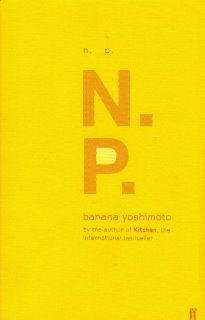Reading Allowed #2
 Banana Yoshimoto “N.P.”
Banana Yoshimoto “N.P.”I’ve been meaning to read Banana Yoshimoto since reading a review of “Kitchen”, the debut novel by this wonderfully named author. I’ve got a VHS tape squirreled away somewhere with a TV recording of the film adaptation which, oddly enough, I’ve never got around to watching. Likewise, after years of deliberation, I spontaneously plumped for Yoshimoto’s 1990 novel “N.P.” whilst wandering around a local bookshop. The aptly banana yellow cover was an added incentive.
I know next to nothing about Yoshimoto; the photograph and biography (three short sentences covering birth year, bibliography, accolades and current residence) give little away. However, there’s a fascinating afterword by the author, where she thanks the reader for taking the time to read her book. I don’t know if this piece is characteristic of Yoshimoto, but her modesty, bordering at times on self-deprecation, enhanced my reflection on the narrative that it succeeds. What immediately appeals about “N.P.” is it’s economy – of characters, environment and language – which enables the reader to develop the author’s themes, characters’ relationships and the world they inhabit. By Yoshimoto’s own admission, she ‘constantly had doubts about (her) approach’, but countered this with an acknowledgement that ‘a degree of self-searching and doubt are healthy for any project.’ “N.P.” encourages the reader to personally invest in the narrative and is a more rewarding experience because of this.
The story centres on Kazami and her developing relationship with fraternal twins Otohiko and Saki Takase, and Otohiko’s girlfriend Sui. All are linked by “N.P.”, a collection of short stories written by the twins’ father whilst he lived in America. Although celebrated overseas, the elder Takase died remaining unpublished in his native Japan. Subsequently, several attempts have been made to translate his work, but death continues to dog it’s completion. Kazami, whose boyfriend was one of the ill-fated translators, learns more about the author, the inspiration for his challenging and uncomfortable final works and, indeed, herself as the quartet struggle to free themselves from “N.P.”’s inexorable pull.
Yoshimoto expertly focuses on this ‘miniature universe’ but uses it to explore a broad range of themes, from lesbianism, family and personal relationships to religion and the occult. With a concision lacking in other writers’ works, Yoshimoto develops empathetic characters who are firmly rooted in the real world. Her frequent references to family, friends and places enhance the readers’ enjoyment, but avoid unnecessary padding or digression. My only criticism – if there must be one – is that I initially struggled with Ann Sherif’s ‘American’ translation, which seemed rather at odds with Yoshimoto’s writing, particularly the dialogue. However, as it becomes increasingly clear that the characters’ experience of the world outside Japan is America, their hybrid language seems increasingly natural.
The “fictional N.P.” is named after “North Point”, apparently a ‘very old’ sad song. The “real N.P.”, exploring ‘troubled people’ and their efforts to ‘live as they please, without interference from others’ is, on the other hand, an ultimately joyous, life-affirming experience. As Kazami notes at the novel’s end, “Everything that…happened was shockingly beautiful, enough to make you crazy.’ “N.P.” is a concise, compelling read that rewards with each turn of the page.



2 Comments:
Hi Bro',
Strangely enough I came within a whisker of buying Kitchen the other day but ended up buying Murakami's Kafka On The Shore instead!
This sounds good, though. Maybe I'll read N.P. before Kitchen...
And hopefully, I'll get around to watching "Kitchen" in the next week or so. Relatively speaking, it may be light relief compared to "United 93", which Claire and I saw last night (review to come...)
Post a Comment
<< Home